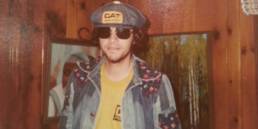
My source waved me — cub reporter — inside his home fast, bug-eyed that someone might spot me on his stoop. His living room was what you’d imagine from a defense industry whistleblower: paper-strewn and dark, smelling of a million tense cigarettes smoked. For the next half an hour, the ex-Northrop Corp. engineer puffed nonstop, regaling me with his inside tale about secret missiles atop US satellites.
“Come over here,” he said, shuffling to his hallway closet. “Check this out.” Then surprise. Into my hands he deposited a Vietnam-era M-16 rifle, whose banana clip he promised to unload should anyone burst through his door uninvited.
My head swam as soon as my fingers clutched that cold steel. Any ambition about a blockbuster article went out of me as fast as a panicky lightheadedness went in. I folded into his ratty chair fantasizing for un-nicotined oxygen. I’d seen some brutal stuff before with no problem, so this wasn’t just squeamishness about being around a freshly oiled automatic weapon. This cut deeper, vibrated more.
Excavating why would stretch years as I researched the biography of my devil-may-care showbiz uncle, who famously broke his neck at Pasadena’s John Marshall Junior High in 1940, and his snakebite family. My M-16 panic attack, I’d see, really wasn’t so random. My genome had suffered flashbacks of gunplay.
In 1915, a stranger peddling “quality” animal hides lured my great-grandfather out of his general store in the Texas border town of El Paso. His bullet-riddled, beaten corpse was discovered near the Rio Grande not long after in a purported robbery-gone-awry. Leap forward a generation. Nat Ross, this man’s eldest son and a onetime Universal Pictures director, also had a date with murder. A lunatic former employee shot him execution-style in downtown Los Angeles, at what’s now a Jack in the Box.
Both father and son perished at the same age (36) on nearly the same day of the year. None of this I knew when I met the man from Northrop. Now, though, the dots connected on a double helix.
Geneticists, in one of the unsung breakthroughs of our time, have fused enthusiasts of Darwin and Carl Jung at the hip of the perennial, nature-versus-nurture debate. Certain ancestral memories, animal experiments prove, can be inherited by minute wrinkles in DNA, rather than just passed down by teaching descendants about their kin.
Researchers at the Emory University School of Medicine in Atlanta recently confirmed this by analyzing the motion of so-called “genetic switches.” They trained one set of mice to fear the smell of cherry blossoms using electric shock and then observed their offspring exhibiting the same reaction the first time they were exposed to the scent. In later biopsies, scientists noticed the odor-detecting gene of the second-generation mice had undergone chemical variations.
These mutations, known as “epigenetic methylation,” give fresh meaning to the maxim “it’s in your blood” — because it is! Mice (and presumably people, too) can embed their own trials and misfortunes on genomes they bequeath to their offspring. A pair of Canadian-based researchers tested their own hypothesis here, curious whether parents’ psychological experiences imprint themselves the same way diet and chemical exposures do. The answer was yes.
The implications, assuming further testing supports it, could rewrite conventional beliefs about genetics, psychology and transgenerational overlap. Inherited experiences, in fact, may underpin some people’s otherwise baffling fear of heights, germs, tight spaces and other phobias. It may account for propensities for depression, post-traumatic stress disorder and the like. When we feel downcast or angry for no tangible reason, it could be those dastardly methyl-molecules reminding us what our grandparents and others saw during pogroms, war, child abuse, illness or neglect decades before our conceptions.
Learning this has made my admittedly obsessive fascination with the past a wee bit more justifiable to friends and fellow writers bewildered by it. “Let it go!” some inferred. But I can’t. Is it really so farfetched to believe that the genome in my kin changed because of gun violence, and they bequeathed it to me like recoded software? After all, Rose Zahler, my maternal grandmother, was the star witness in the sensationalized murder of the father discovered boots up in the Texas silt, and was knocked loopy when her brother, Nat, fell to the muzzle flash. You think that left her molecular biology unscathed?
What scientists aren’t sure about is proportion: How much of our characteristics originate from passed-down experience rather than understood genetics? I’ll leave that question for the labs, but wonder how many people hog-wild over genealogy hunting intuit their hardwired personality connection to those fuzzy-pixelated faces online. Common sense suggests it’s more than tracking down long-lost cousins, or determining if Donald Trump is related to Lenny Bruce.
This, I know, is no hunch. My uncle, Gordon Zahler, the 95-pound quadriplegic who lived as hard as a dozen able-bodied men, and I were cut from the same cloth. Denying it would be shameful. He was a spritzing wellhead of ideas, with a mouth that sometimes didn’t know when to stop and an impish streak as wide as the Sunset Strip. Me: guilty on all counts. His mother, who sacrificed everything for him to outlive her, used to clean like a methed-up Hazel when upset. So do I.
Over the past decade, I’ve adopted them all, these ghosts in my bloodstream, as I meandered through other literary projects. I wondered about their fateful turns as I interviewed crying widows for my “Fargo”-esque true-crime book. I imagined them as holograms shadowing me while speaking about toxic smog at a Beijing climate conference keynoted by Al Gore. I’ve relived their dying moments more than I pondered what my own might be. This is as much accident as my kinked blood pressure gripping that M-16.
Gazing into the patient room of tomorrow, it’s thrilling to imagine doctors interviewing patients about their ancestors’ lives as much as they do their exercise regimens or pork consumption. For now, these insights into what one writer tagged our “genetic scaffolding” are still embryonic. They’re certainly silent whether our ancestors’ more positive experiences or quirkier traits piggyback onto our DNA. I hope we glean more, because my toe tapping and irritating energy aren’t pure accident. They’re my gene genie.




